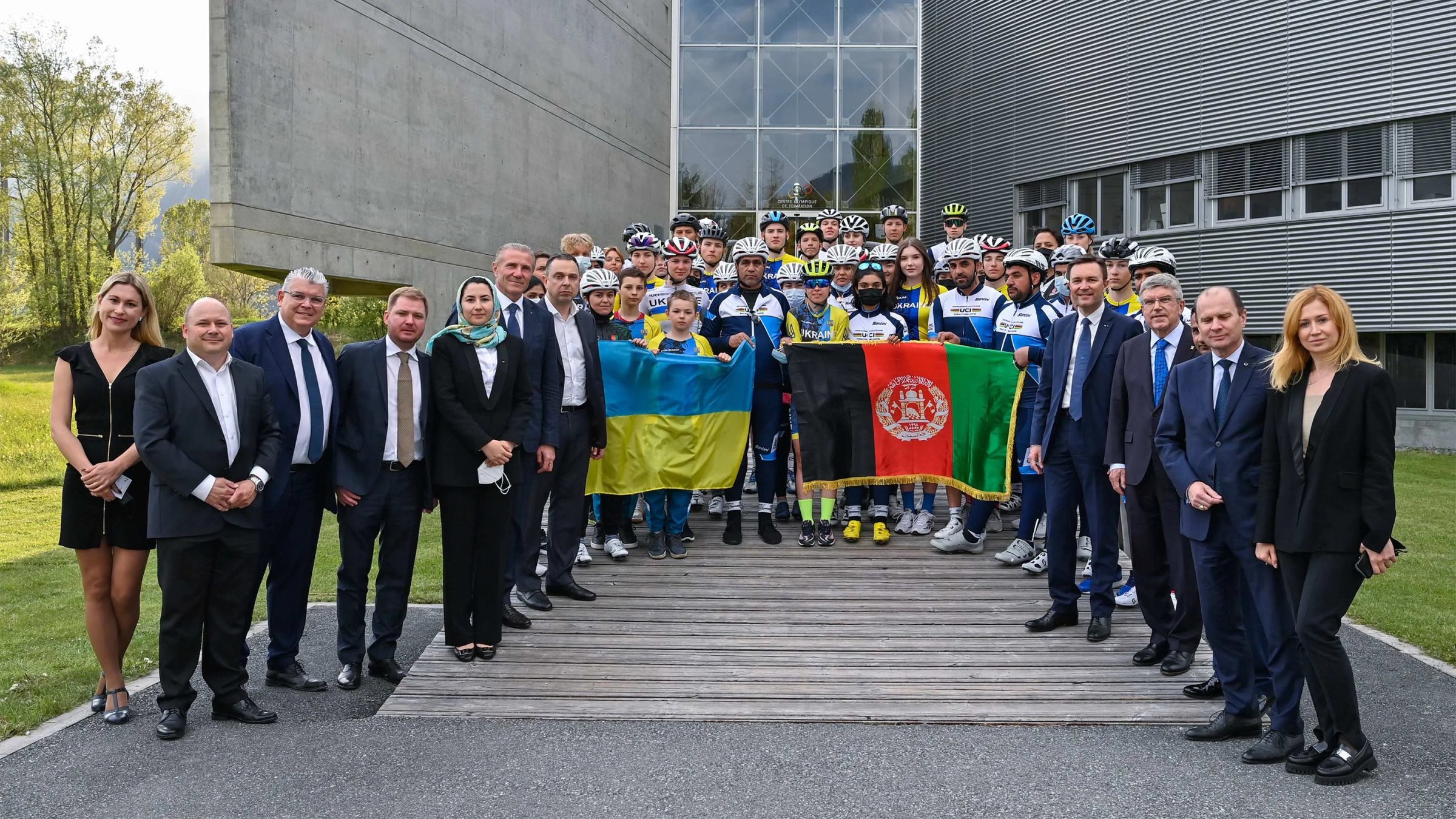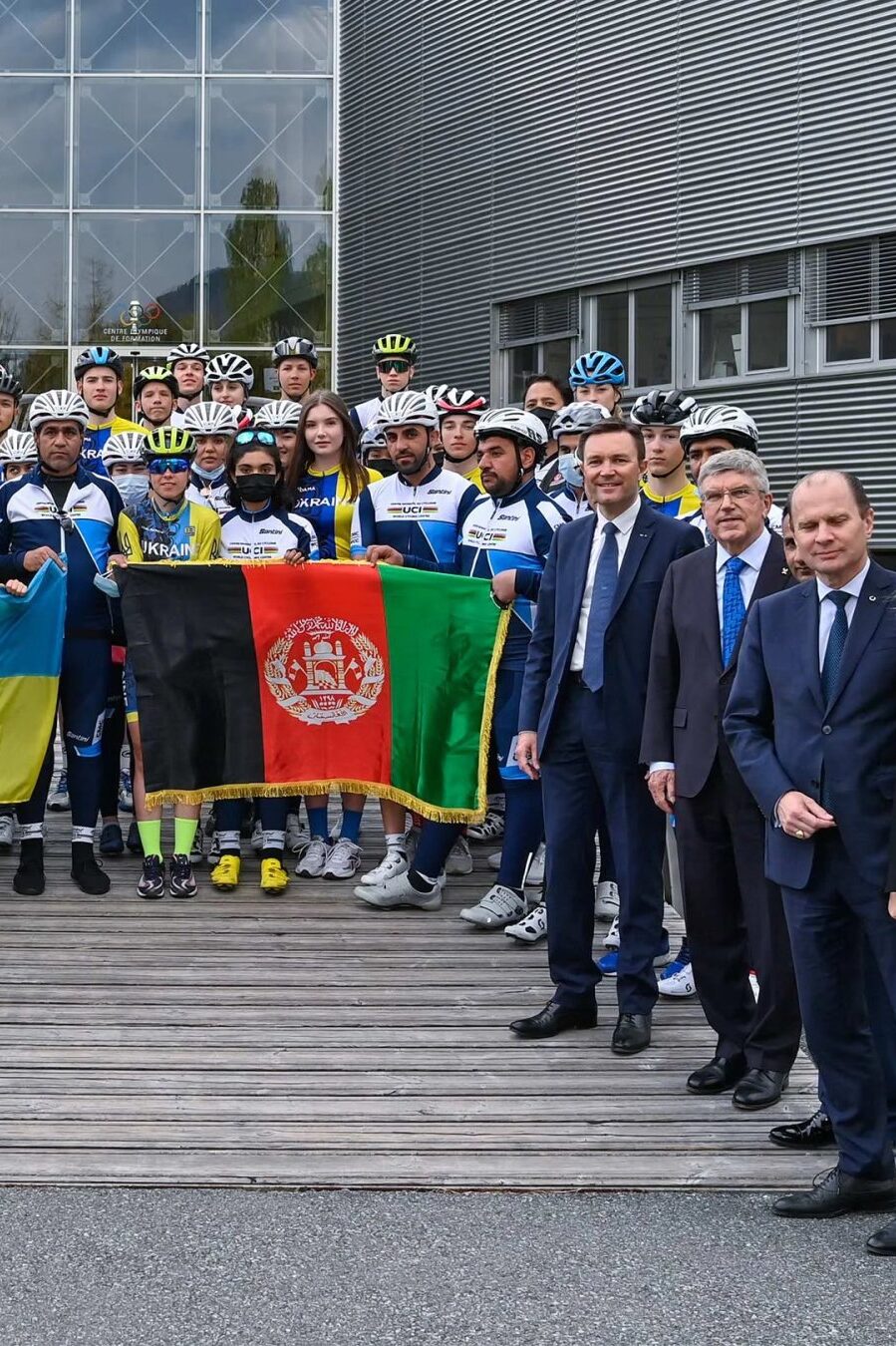Two weeks ago, the UCI Ethics Commission released a report compiling its most recent findings – a grab bag of decisions including the suspension of the Ukrainian Cycling Federation President for “insulting language,” a reprimand against the Slovak Cycling Federation for excluding an assistant driver from a race without cause, and a request for Patrick Lefevere to apologise for his repeated sexist attitudes. The last of these drew the majority of the cycling media’s gaze, while garnering less attention was a finding both more impactful and troubling: the latest update in the long-running saga of the Afghan Cycling Federation, which the Ethics Commission has handed down partial findings on … more than two years in the making.
At a superficial glance: the UCI Ethics Commission has “confirmed the closure of all investigations related to the humanitarian operation” which saw more than 150 individuals evacuated from Afghanistan after the fall of Kabul in 2021. “The Ethics Commission found that there was no evidence justifying the pursuance of the investigations on allegations of breach of the UCI Code of Ethics,” the statement notes.
But while this restores some of the sparkle to the UCI’s evacuation efforts, there are – as has been the case throughout this twisting, sordid saga – more questions remaining than answers. The most significant one being the fact that the investigation is only partially completed; the most serious allegations are still working their way past the Ethics Commission panel, with no end in sight.
The backstory
For the genesis of this drawn-out, contentious tale, cast your mind back to early October 2021, in the wake of the Taliban’s return to government in Afghanistan. Cyclists – especially female cyclists and members of the Hazara ethnic minority – found themselves facing persecution, and the UCI, working with a number of government and NGO actors, coordinated the evacuation of a group of 165 people from Kabul. By November, however, this brave humanitarian moment had soured, with allegations that all was not as it seemed. Numerous sources told this journalist – at the time reporting for CyclingTips – of their belief that the flight manifest had been manipulated by senior figures in the Afghan Cycling Federation to favour family and friends, to the exclusion of cyclists who felt themselves deserving of a spot on the evacuation.
The UCI, proud of its hard work on the evacuation and upset that its achievement was under scrutiny, closed ranks in support of the Afghan Cycling Federation and its president, Fazli Ahmad Fazli, who they had awarded with a UCI Merit Award in recognition of his work in support of the Afghan cyclist community. This support of Fazli continued even after further allegations of the verbal and physical abuse of a number of cyclists. One cyclist alleged that he had been abducted and beaten at the orders of Fazli; several other cyclists were recipients of death threats; three female cyclists of the Hazara minority alleged that they had been repeatedly disparaged by Fazli while in Switzerland under the guardianship of the UCI.
Media reporting on the allegations were met with either silence [at one point, CyclingTips received no response to 13 consecutive requests for comment] or outright hostility from UCI President, David Lappartient. “We do not respond to CyclingTips. I will never answer to this guy. He is someone who cannot be trusted,” Lappartient said. The blocking of World Championship accreditations for this journalist, seen by many as an act of retaliation for reporting that was critical of the UCI, further increased public scrutiny on the case.
After a growing wave of pressure on the UCI – including independently reported stories on CyclingNews and Swiss television, backing CyclingTips’ reporting – a formal complaint against Fazli was filed in May 2022 with the UCI Ethics Commission, an independent body tasked with overseeing and enforceing the UCI Code of Ethics. At both the 2022 and 2023 UCI Congress, the Ethics Commission progress report noted the ongoing investigation into the claims against the Afghan Cycling Federation. Now, at least one phase of that investigation has concluded.
What next?
The Ethics Commission finding absolves the UCI of any negative repercussions from the humanitarian component of the affair, but it’s far from a clean slate on the whole case. According to the press release accompanying the finding, “an inquiry remains ongoing regarding other reported potential violations of the UCI Code of Ethics involving the President of the Afghan Cycling Federation” – which, again, are allegations that the UCI has had on its radar for two and a half years, and which have been before the Ethics Commission for most of that.
This leaves the most serious allegations on the table, comprising the bulk of the substance of the initial report. In response to a request for comment from Escape Collective, the secretariat of the Ethics Commission said that “the case at hand is particularly complex considering the number of persons interrogated, the languages [sic] barriers and requests for anonymity.” A source involved in the case told Escape that anonymity has been a persistent sticking point in the investigation. A request was made last year for certain anonymous sources to be identified in the course of the proceedings – a risky move for those individuals, as it potentially exposed them to further recriminations.
In comments to Escape, the Ethics Commission stressed that it “continues to exercise its functions in an independent manner and as efficiently as possible to safeguard the integrity and reputation of cycling throughout the world.” That independence can only be taken at face value, but it sits in uneasy parallel with the facts that the President of the UCI has demonstrated scorn for the allegations and public support for the alleged perpetrator.
Given the sensitivity of the investigation, and the amount of skin in the game for the UCI and its leadership, it’s reassuring that the case is being considered seriously, but the lengthy timeline – and lack of a firm timeline for further findings – simultaneously reduces the benefit of any outcome. Many of the athletes involved are building new lives for themselves around the world, trying to move on from a tumultuous period that has torn them away from their homeland in traumatic circumstances, compounded by the alleged abuses of the Federation that was supposed to be supporting them. It also raises concerns about the capacity of the Ethics Commission to officiate on cases such as this and whether it is properly equipped to investigate allegations across language barriers and with respect for anonymity of complainants in a timely fashion that can produce an outcome that actually benefits the victims.
Almost three years ago, life as normal was shattered for the people of Afghanistan, and its cyclists. The bravery of the UCI helped rescue a number of them from an uncertain fate, but the ripples from that event continue to spread. In many ways, it’s a curious case: a humanitarian tale that touches on politics and sport and the ethics of the intersection of the two. But, years later, it’s also a tale of slow-moving bureaucracy and the fallibility of institutions to respond to crisis.
Did we do a good job with this story?


